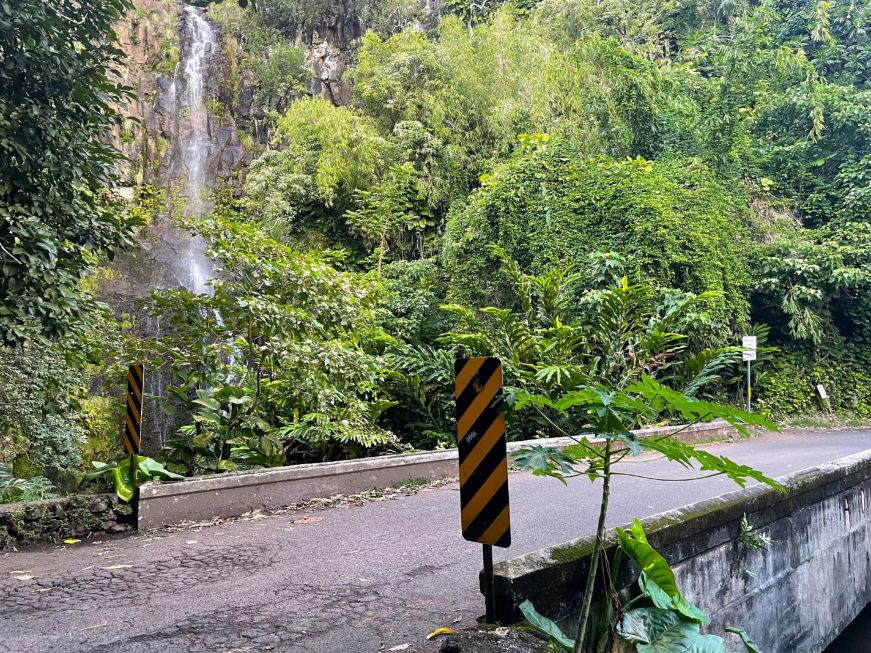
This post was originally published in December 2015 and was most recently updated on January 10, 2024.
As I mentioned in my Maui post, the Road to Hāna/Hāna Highway is a winding, narrow rainforest road that's a highway only in the technical sense of the term. It's only about 60 miles from the beginning of the Hāna Highway to Hāna, but your drive will take all day—there's a 25 mile per hour speed limit for much of the route, dozens of one-lane bridges, frequent photo stops, detours for hikes, and multiple swimming opportunities. There's no conceivable way to see every stop along the way in one day, so pick the sights that look most interesting, relax, and enjoy the drive.
From a culinary standpoint, the Road to Hāna can be hit and miss. There are food stands, food trucks, fresh coconut vendors, and self-serve fruit stands along the way, but hours and offerings can be inconsistent. If you need to eat on specific schedule or if you have specific dietary needs or preferences, I recommend bringing your own snacks and/or a picnic lunch.
For me, the Road to Hāna serves as a needed reminder there is whole lot more to travel than the food. On each trip to Maui, our drives on the Road to Hāna have been glorious: sweeping vistas of the ocean, hikes through a lush rainforest, tumbling waterfalls along the roadside, body surfing at an idyllic beach, and just breathing in the humid, fragrant air with the windows rolled down and gentle Hawaiian melodies on the radio. This post might be short on tips about local eats, but it will still help you enjoy the journey.
Here are my favorite stops on the Road to Hāna, plus helpful tips for making the most of your drive.
If you're considering spending the night in Hāna, here's some additional information: Is it worth it to spend the night in Hāna, Maui?
Top 7 Road to Hāna tips:
1. Take a guidebook (or guidebook app). We've used Lonely Planet Maui that lists the sights both by landmarks and mileage marker and GuideAlong's Road to Hana Tour. A helpful free option is this Road to Hana website, which offers a comprehensive list of sights by mileage marker. However, the directions aren't as detailed as Lonely Planet Maui and since you won't have phone service for most of the drive it's not as useful as the GuideAlong app.
2. Fill up your tank with gas. Fill up in Kahului or Pā'ia, since the only gas station along the route is in Hāna.
3. Bring water and snacks. This is especially important if you have dietary preferences and/or tend to get irritable when you're hungry—you want to be able to enjoy the drive! There are some roadside stands along the way, but it's better to be prepared.
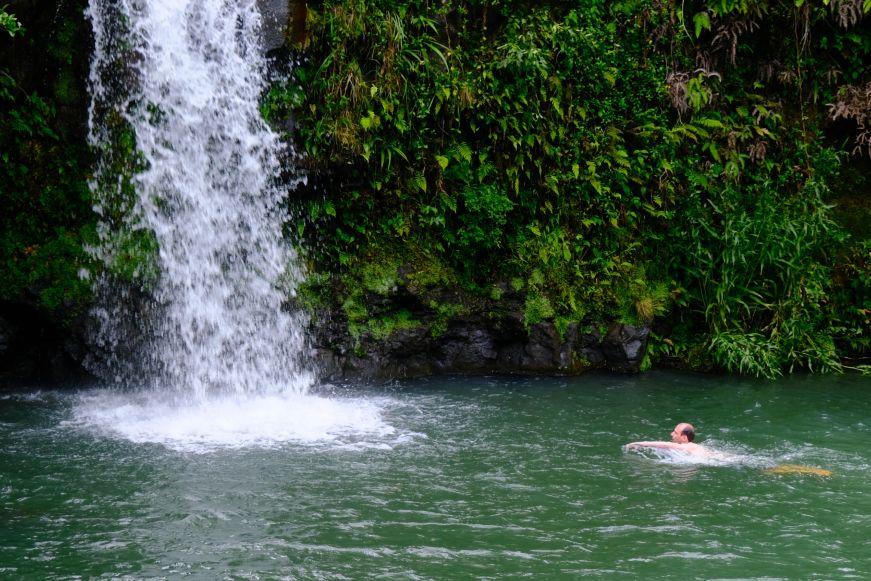
4. Wear your swimsuit and bring a beach towel. There are several opportunities along the way for an impromptu dip. Some of our favorite spots for swimming are the waterfall-fed pool at Pua'a Kaa State Wayside Park (mile marker 22) and Hamoa Beach (mile marker 50).
5. Bring hand sanitizer. Although there are bathrooms with running water at several stops, soap isn't available. This is also good tip for Hawaiian travel in general, since most beach park, state park, and municipal bathrooms don't have soap.
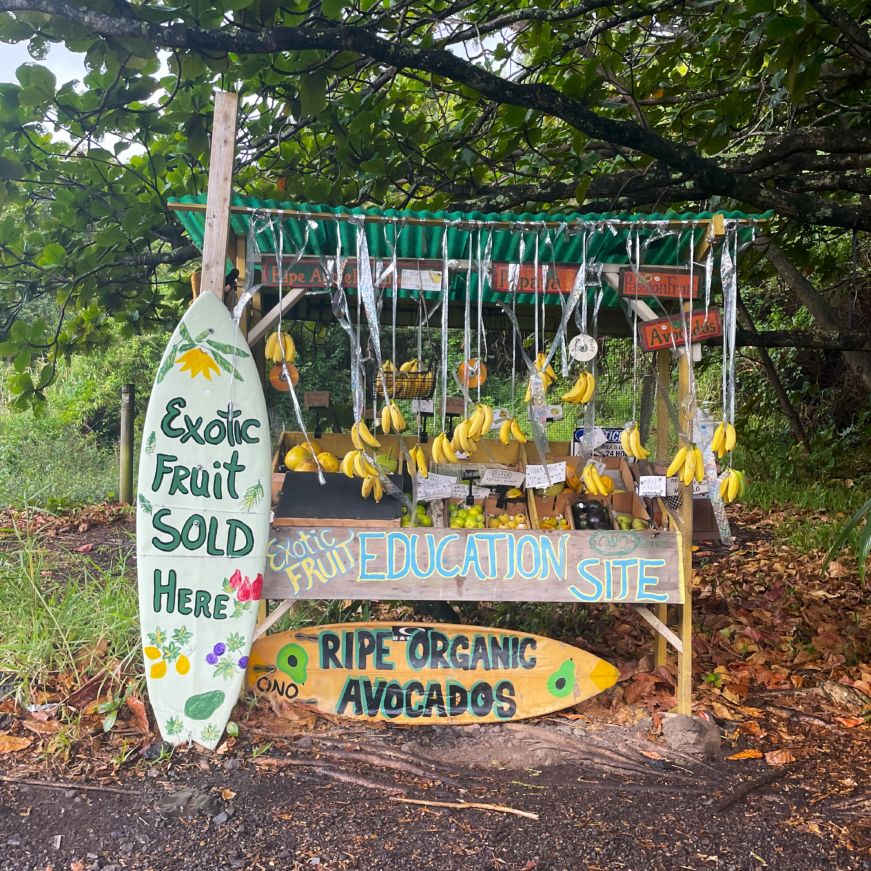
6. Carry small bills (ones and fives). Many fresh fruit stands are self-serve, so you'll need to leave exact change in the cash box.
7. Be mindful of other drivers. If you're parking along the side of the road, make sure there's enough space to cars to pass. If possible, pull over to let locals pass you—they drive the Hāna Highway daily and are comfortable taking the sharp turns at higher speeds. Yield to opposing traffic on one-lane bridges, and obey all the signage. Do your part to make to make driving the Road to Hāna a good experience for everyone.
14 best stops on the Road to Hāna:
Mile markers are from east to west (i.e. starting in Pā'ia and driving to Hāna). Note that mile markers ascend until Hāna, and then descend.
1. Twin Falls (mile marker 2)
Twin Falls is a bit of a crowded tourist trap, but if you get there first thing in the morning before the crowds it's a fun stop to get in the mood for the rest of your drive. However, I'd skip it if you want to make two or more swimming stops.
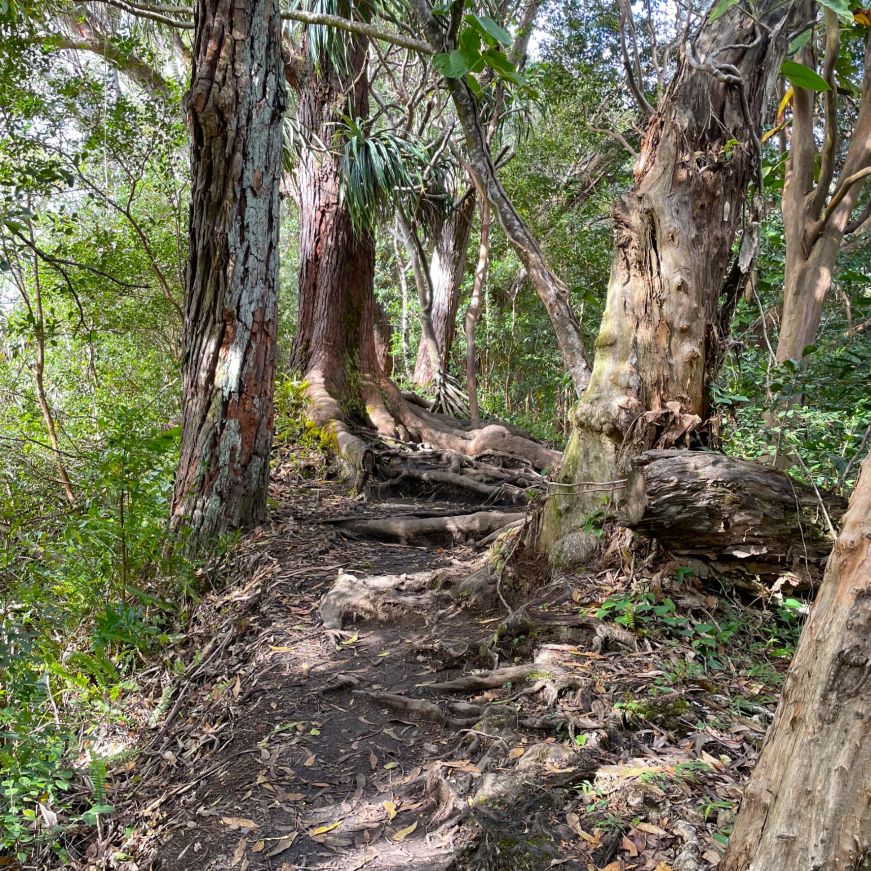
2. Waikamoi Ridge Trail (mile marker 9.5)
The Waikamoi Ridge Trail is a relatively quick and easy hike that gives you a taste of East Maui's lush rainforest—allow about 30 minutes if you want to walk at a leisurely pace. The trail is muddy, so wear sturdy shoes.
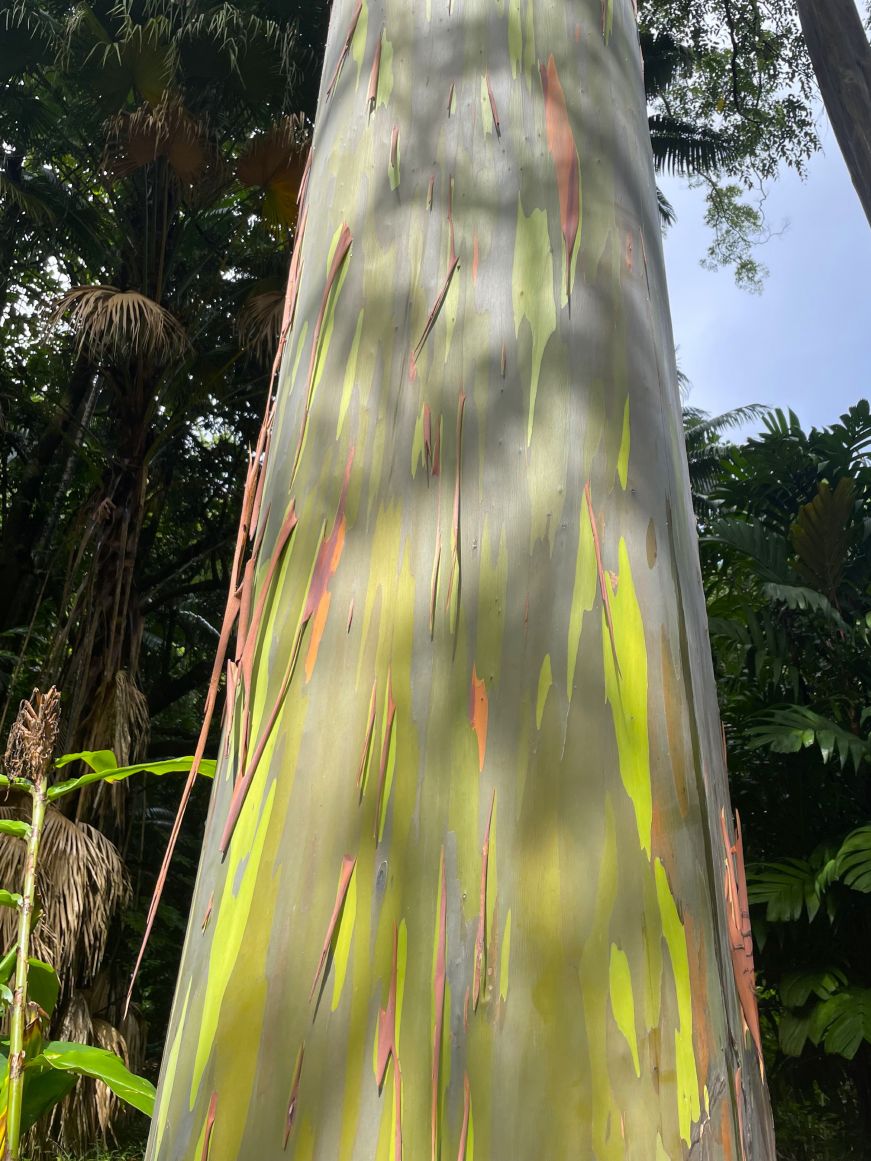
3. Ke'anae Arboretum (mile marker 16)
The Ke'anae Arboretum is home to various tropical tree species, a small bamboo grove, and taro ponds. It's free of charge and worth a 30-minute stop—although they're not native to Hawaii, I love the rainbow eucalyptus trees, which have colorful red, yellow, and green-striped bark.
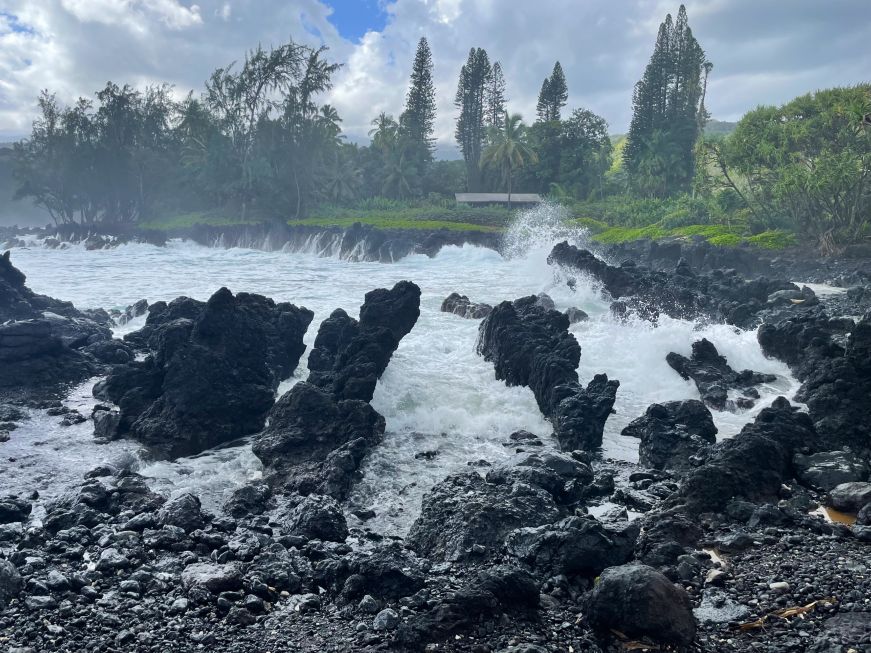
4. Ke'anae Peninsula (turn off on left past mile marker 16)
The Ke'anae Peninsula is a short detour off the Road to Hāna—drive to the end of the road to see huge waves crashing against the rocky shore. There are restrooms near the parking area. Be sure to stop at Aunty Sandy's Banana Bread, a food stand that sells freshly-made loaves of banana bread, smoothies, coffee, plus some snacks and lunch items. The banana bread is amazing—incredibly moist and flavorful, it's so much better than anything I've tasted on the mainland. Buy an extra loaf for later!
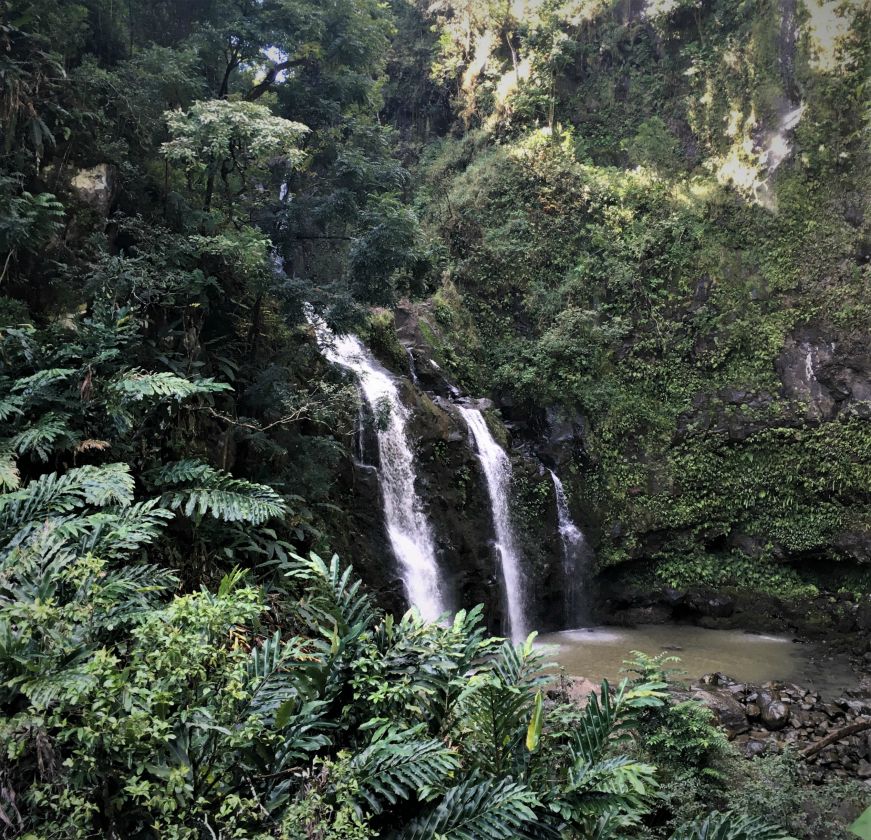
5. Upper Waikani Falls (mile marker 19)
Upper Waikani Falls is also known as Three Bears Falls—when the water flow is just right, it forms a row of three waterfalls that decrease in size. There's roadside parking just past the waterfall, so you can park and walk back to the falls for a photo opp.
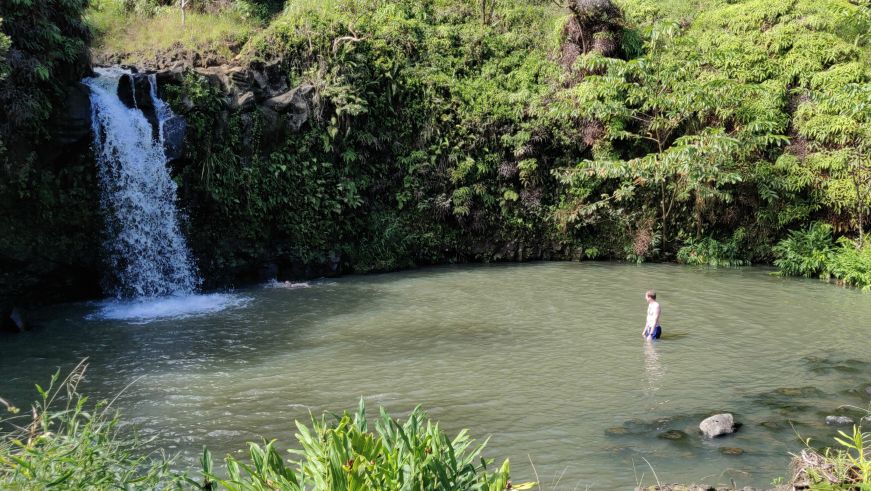
6. Pua'a Kaa State Wayside Park (mile marker 22)
Pua'a Kaa State Wayside Park has a waterfall-fed pool that makes for a scenic swim, albeit a chilly one. Scrambling over the rocks and muddy trails to the pool is a bit of an undertaking, but for Mike it's worth it every time. The wayside park also has picnic tables and restrooms, although the water is not safe to drink.
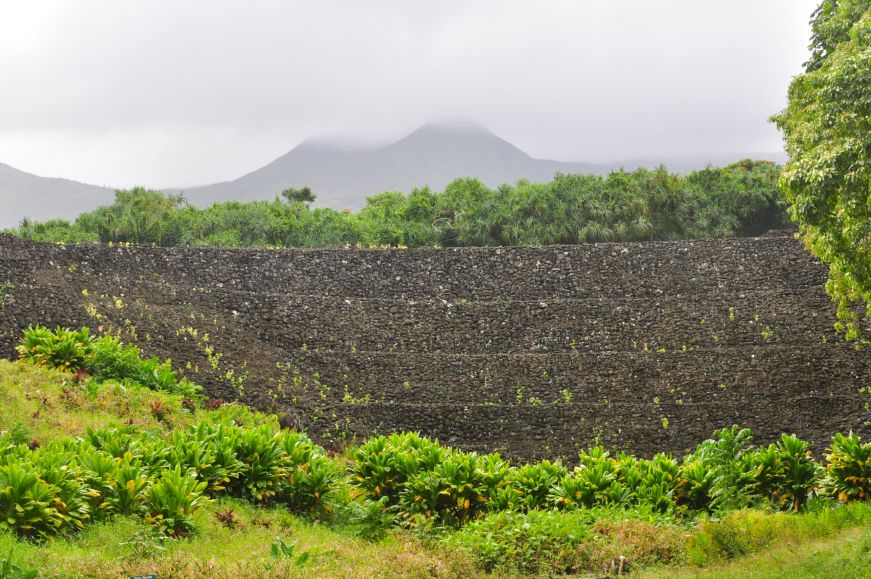
7. Kahanu Garden (turn off on left at mile marker 31)
Kahanu Garden is home to plant collections representing species from across Polynesia, as well as Pi’ilanihale Heiau, a National Historic Landmark. A heiau is a shrine used for religious ceremonies, and Pi’ilanihale Heiau was built starting in the 13th century and is the largest heiau in Polynesia. It's a truly impressive sight, and there are interpretive signs throughout the garden with information about Hawaiian culture.
As of January 2024, admission to Kahanu Garden is $18 for adults and $10 for Hawaiian residents, with free admission for children 12 and under. I'd allow at least an hour to tour the garden.
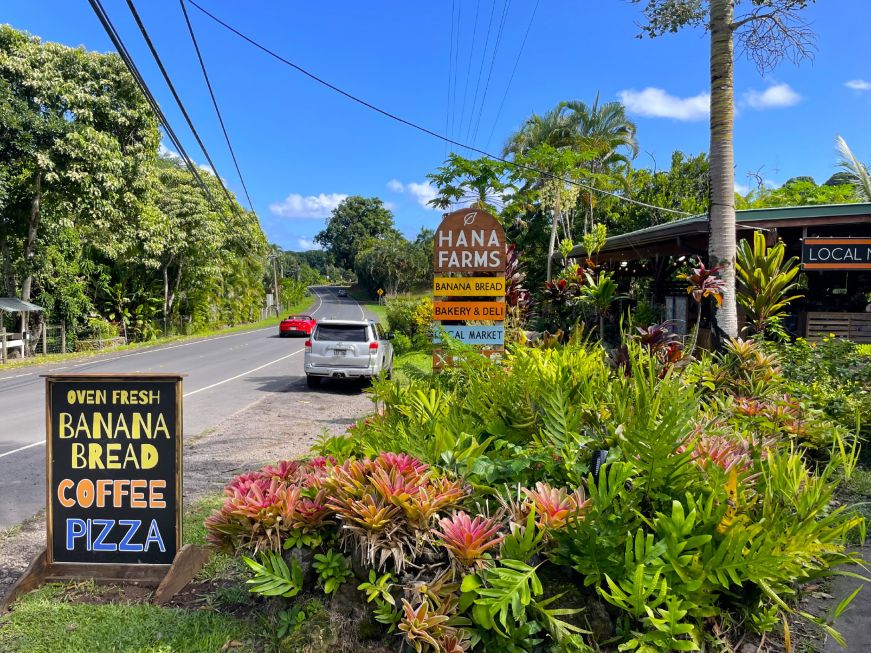
8. Hana Farms (mile marker 31)
Hana Farms operates a farm stand with locally grown produce, gift items, baked goods, and coffee (I love their enormous aloha cookies loaded with chocolate and macadamia nuts), plus an adjacent restaurant with a menu of pizzas and salads. The wood-fired pizzas are quite large and can be shared, and are loaded with Maui-grown produce and meat, with many ingredients grown in-house. I especially enjoyed the ulu (breadfruit) and pesto pizza.
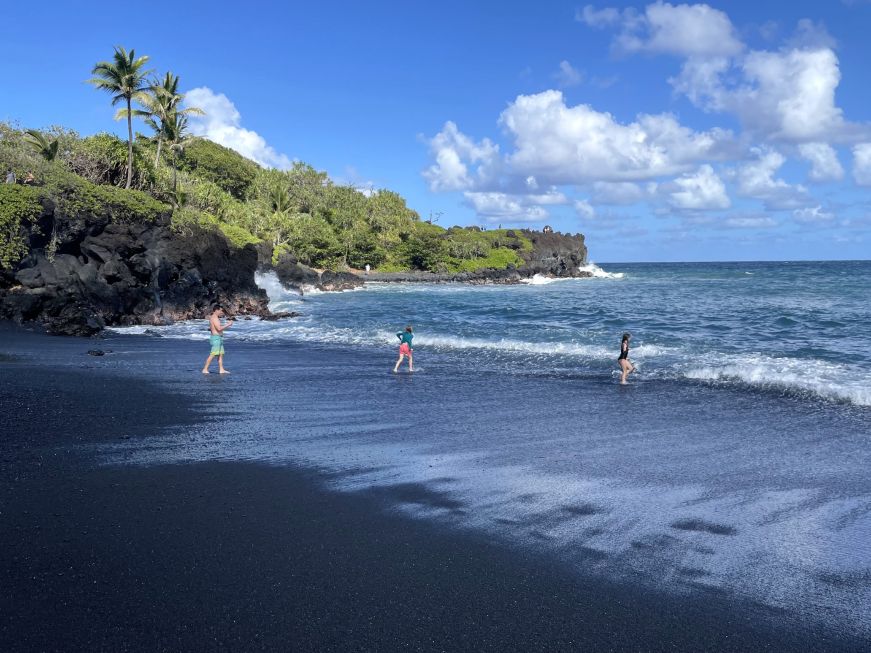
9. Waiʻānapana State Park (mile marker 32)
Waiʻānapana State Park has a stunning black sand beach, a hiking trail along the ocean with great views, and an expansive picnic area that's the perfect spot to enjoy packed lunch. Restrooms, drinking water, and outdoor showers are available. Note that a timed reservation is required and can be made online. As of January 2024 the fee for out-of-state visitors is $10 per vehicle plus $5 per person.
If you're starting in Pā'ia and plan to get an early start, I recommend reserving the 12:30pm-3:00pm time slot. You're able to enter the park at any time during your time slot (we got there around 1:30pm) and are allowed to stay until the end of your allotted time slot. I would allow at least one hour to see the black sand beach and hike, and add on more time if you'd like to picnic or go swimming.
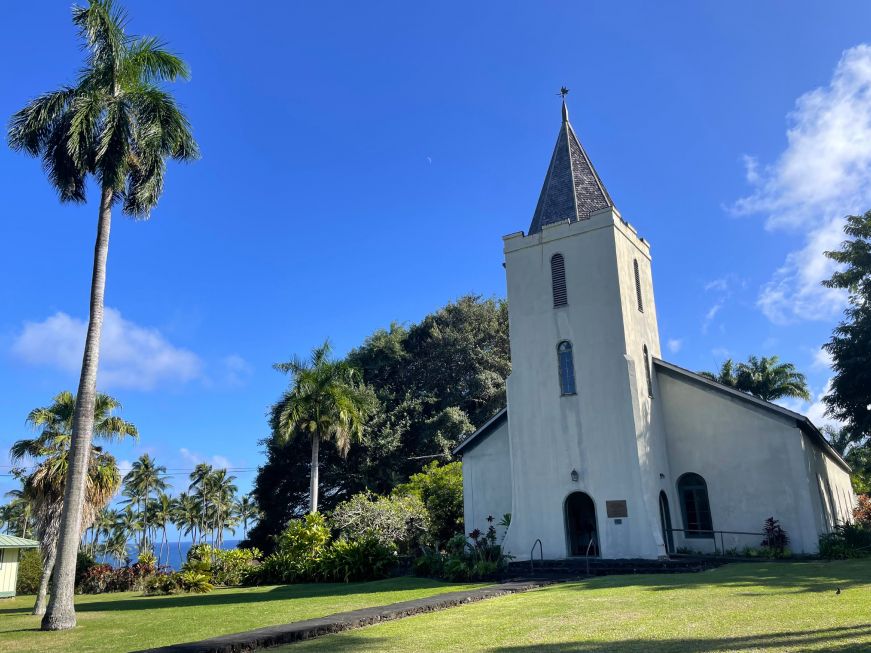
10. Hāna (mile marker 34)
Hāna is a low-key small town, with a handful of restaurants, a food truck park, and a couple of historic churches—although there aren't any headliner attractions, it's a great spot to stretch your legs and wander around for 30 minutes or so. If you happen to be driving through on a Friday from 3:00pm-4:30pm, stop by the Hāna Farmers Market for locally-grown produce and food products—the avocados we picked up there were wonderful. The Hasegawa General Store is worth a visit, both for Hāna souvenirs and to marvel at the variety of merchandise packed into a relatively small space. Hāna Bay Beach Park has pretty scenery and is safe for swimming, plus there are portable toilets (other than municipal recreation facilities, public restrooms are in short supply in Hāna).
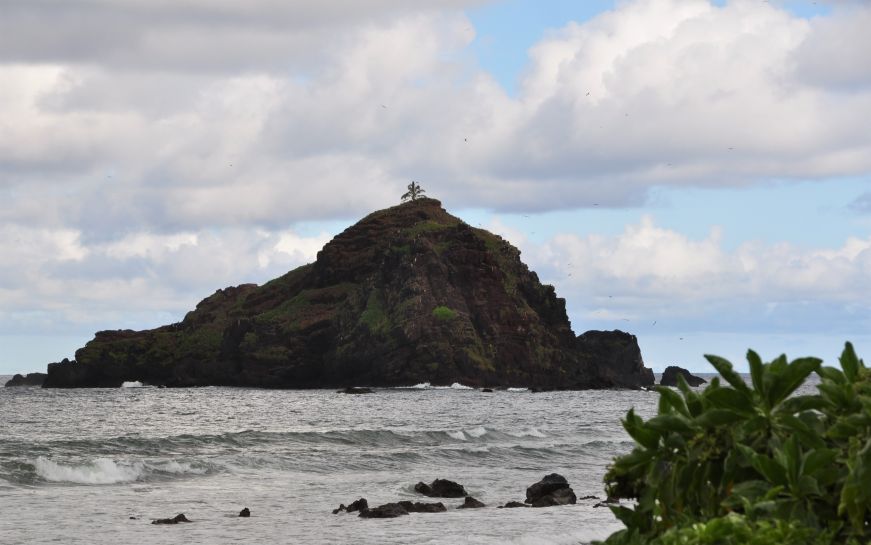
11. Koki Beach (mile marker 51)
Koki Beach isn't safe for swimming due to large waves and offshore rip currents, but it's worth stopping for the view of the picturesque 'Alau Island, which is topped by a single jaunty palm tree. If you'd like to visit Hamoa Beach, continue along Haneo'o Road, which hugs the coast, instead of backtracking to the Hāna Highway. It's a picturesque route that will save you a little bit of time.
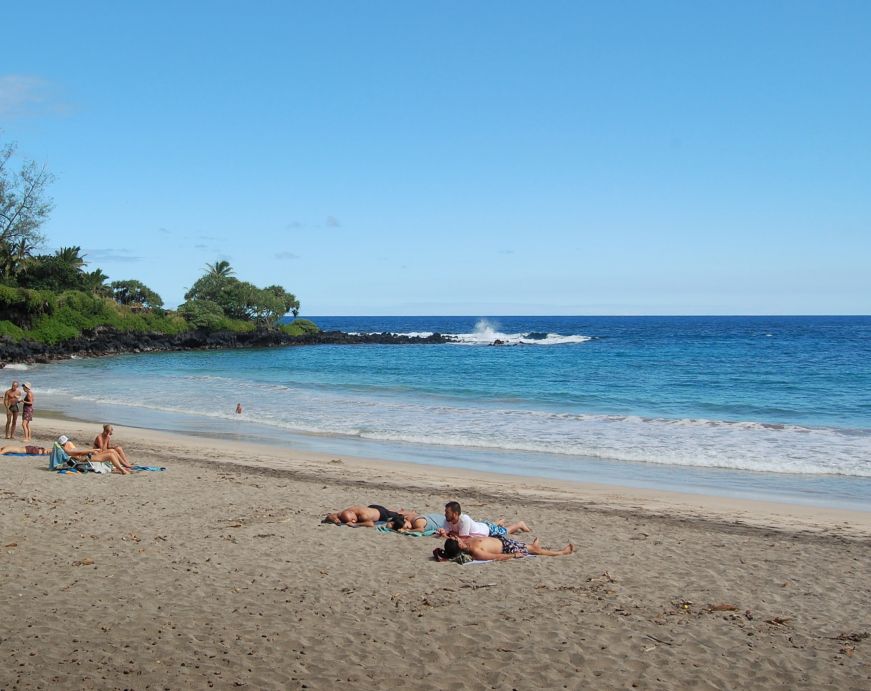
12. Hamoa Beach (mile marker 50)
Hamoa Beach is a sandy beach that's great for sunbathing and swimming—the sand is so soft it feels like a plush blanket. This is my favorite spot for swimming on the Road to Hāna. An outdoor shower is available.
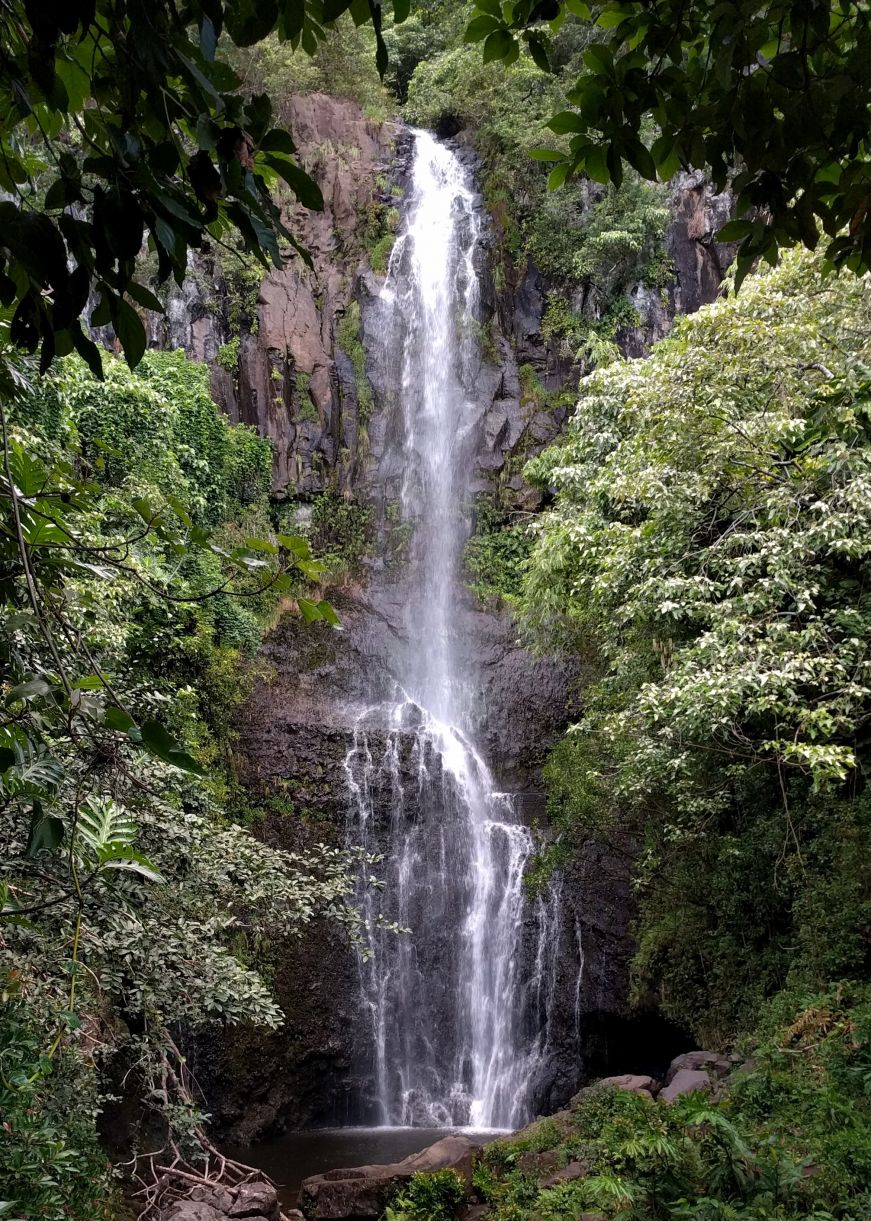
13. Wailua Falls (mile marker 45)
Wailua Falls is my favorite waterfall along the Road to Hāna. Water gracefully tumbles 80 feet down a rock wall, surrounded by a lush rainforest.
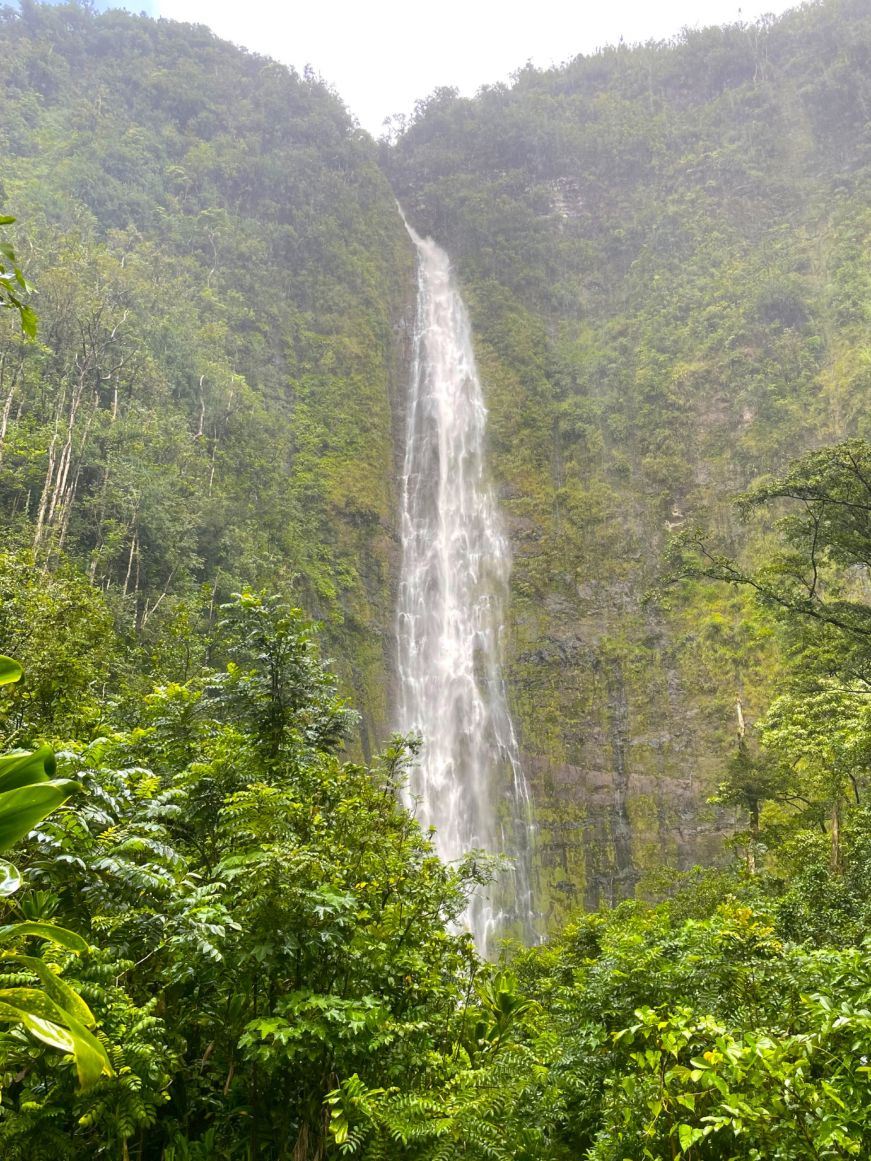
14. Haleakalā National Park's Kīpahulu District (mile marker 42)
Haleakalā National Park's Kīpahulu District has two hiking trails, both of which I highly recommend. The Kūloa Point Trail is a 0.5 mile round-trip trail that features ocean views, archeological sites, and the Pools of 'Ohe'o, (sometimes called the Seven Sacred Pools). The Pīpīwai Trail is a more ambitious 4 mile out-and-back moderate hike through the rainforest, with views of Makahiku Falls and Waimoku Falls, plus bridges over streams and a boardwalk through a bamboo forest. The park also has a small visitor center with a gift shop, restrooms, and drinking water.
As of January 2024, admission to Haleakalā National Park is $30 per vehicle for a three-day pass that includes both the Kīpahulu and Summit Districts.
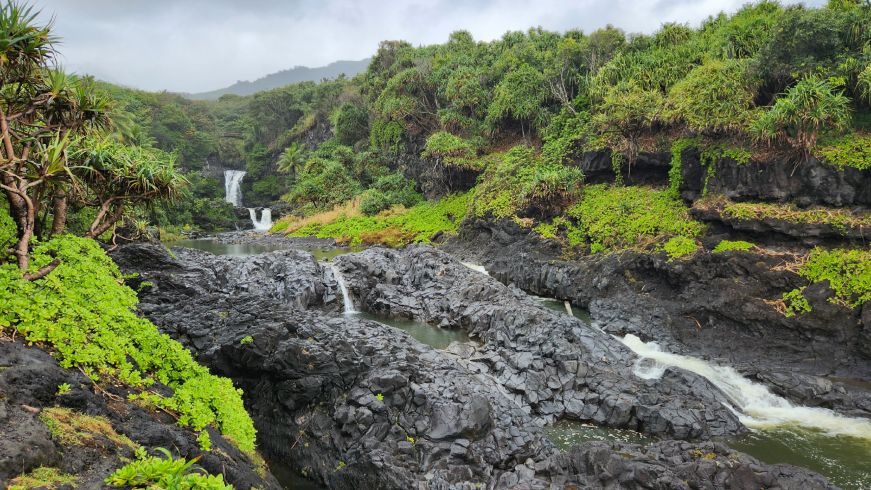
Getting back to Kahului
Many guidebooks advise against driving the "back side" of the Road to Hāna (i.e. continuing around the island back to Kahului instead of doubling back). Sections of the road are unpaved and narrow, with blind curves that require you to honk before proceeding. It's isolated and there's limited phone service, so if you have car trouble, getting help will be a long and expensive undertaking.
On the other hand, the "back side" is a shorter route to Kahului, and the scenery is stark but awe-inspiring—the ocean on one side, the rim of the Haleakala crater on the other. We've driven the route three times in a compact car, and we didn't find it markedly more perilous than the Road to Hāna. However, it is stressful, and if you're driving after dark there is more of a risk of a collision with the free range cattle that wander across the road. On our 2023 trip, a park ranger at the Kīpahulu District of Haleakalā National Park strongly advised against taking the back side after a heavy rainstorm, since cars can get stuck in the unpaved sections of the road and conditions are especially treacherous.
If you have the money and the time, consider spending the night in or near Hāna so that you can drive back in the daylight, whichever route you take—that's what we did on our 2023 trip.
Further reading:
- Is it worth it to spend the night in Hāna, Maui?
- Maui: Favorite places to eat, see, and stay
- Kaua'i: Favorite places to eat, see, and stay
- 7 low-key things I loved about Hilo
- A tourist's guide to grocery shopping in Hawaii
- A guide to Hawaiian shave ice
Further viewing: Relaxing and beautiful Maui, Hawaii Mike made this relaxation video with footage from our 2023 trip, including drone footage of the Road to Hāna.
If you enjoyed this post, pin it!

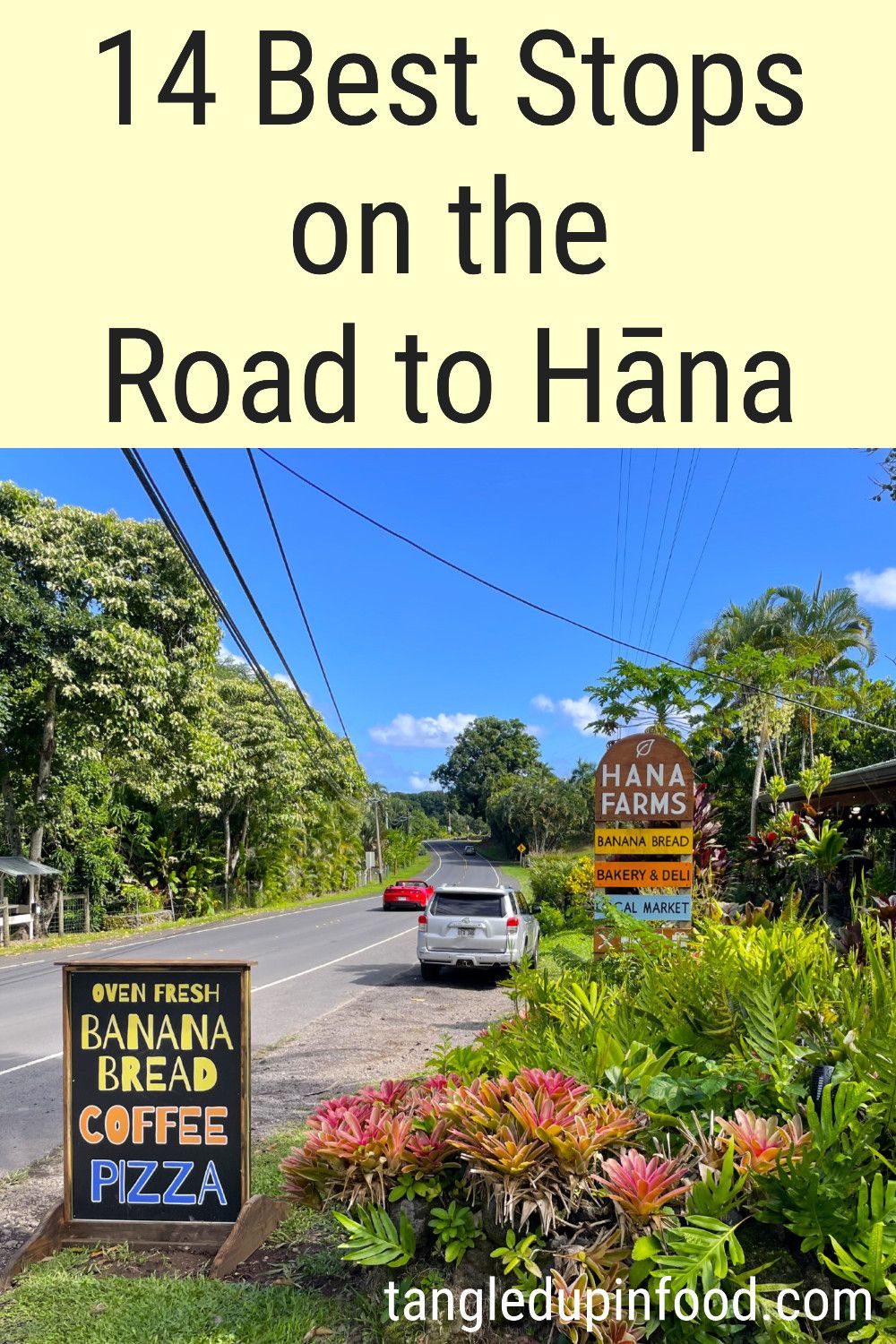
Share your thoughts
Hana will be on hit list to…
Hana will be on hit list to go ahead after boat tour dc. I hope in this way there will be fun views to enjoy and capture like you .